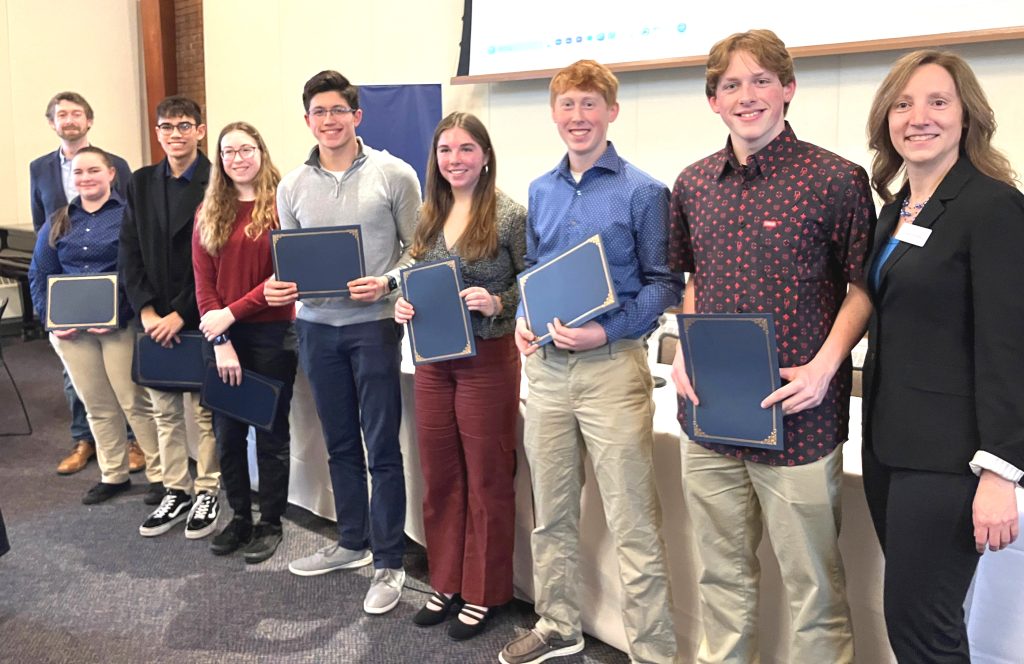
Youth Look To Engage Peers More Fully in Elections, Governance
By TERESA WINCHESTER
ONEONTA
Young people have the power to change the political landscape, as evidenced most dramatically in the 1960s with youth involvement in the civil rights movement and opposition to the U.S. military presence in Vietnam. In recent years, however, youth participation in politics, especially with regard to voting, appears to have dropped off.
Tufts University’s Tisch College Center for Information and Research on Civic Learning and Engagement estimates turn-out from voters age 18-29 in the 2022 midterm elections to have been 20.7 percent in New York State. Simply put then, only one in five of the youth vote showed up at the polls in New York State for a high stakes midterm election.
Hartwick College’s Institute of Public Service’s website also cites these figures, surmising, “That means that more than two million eligible young people in New York did not vote, a total that would have easily changed the outcome in any of the statewide political races.”
Seeking ways to change downward trends in youth voting, Hartwick’s IPS invited high-school students from a nine-county area to submit essays or videos identifying reasons for dissatisfaction with the political process among young people and suggesting ways to more actively engage them in democracy.
On Tuesday, January 16, finalists from Oneonta and Unatego high schools and Delaware Academy (Delhi), presented their ideas at an event held at Hartwick’s Shineman Chapel.
Martha Dolan of Unatego High School suggested civics classes be based on community discussions emphasizing the importance of the individual’s vote. She also stated that teachers should facilitate voter registration for students, that college campuses do more to facilitate the voting process, and that politicians actively visit college campuses.
Chase Birdsall, also of Unatego High School, put forth the idea of declaring Election Day a national holiday, also suggesting that a “jury-duty-like” system be devised to ensure adequate personnel to oversee elections.
Oneonta High School student Victoria Heilveil proposed doing away with voter registration altogether, citing North Dakota as an example of a state that has done so.
“Eradicating the concept of voter registration would enable more people to vote, since not only would it become easier to actually go to vote the day of the election without being prepared months in advance, it would also prevent people from losing the ability to vote by being removed from voter registration lists,” Heilveil wrote in her summary remarks.
Heilveil also thinks that voter participation would be increased by both term limits and age limits and would like to see a greater emphasis on the importance of voting come from elected officials themselves.
Oneonta High’s Elias House suggested rearranging the years that credit for government classes are given.
“Make a government credit a freshman year credit. Sometimes seniors who are registered to vote haven’t taken the government credit course,” he said, adding that he would like to see schools made into polling places so that teachers and students could vote more easily.
Two other Oneonta High students, Grace Shultz and Bastian Dudley, co-presented. Social media is “a great way to reach out to young voters,” they said, citing Taylor Swift’s September 2023 Instagram tweet urging her 272 million followers to register to vote. Her tweet resulted in more than 35,000 registrations, according to Vote.org., the organization to which she directed her fans.
Shultz and Dudley also thought that more information about alternative candidates might increase voter participation among young voters because, they said, young people are not attracted to the mainstream candidates.
Cooper Cohen, from Delaware Academy, proposed “taking a page out of Big Tobacco” and utilizing product placement to increase voter participation among young voters.
“In an episode of SpongeBob SquarePants, talk about going to the polls,” he said.
Cohen also advocated for more precise instruction on the “how to” of voter registration and suggested greater use of “iCivics,” a non-profit organization which provides educational online games and lesson plans promoting civics education and encouraging students to become active citizens.
Oneonta Mayor Mark Drnek offered concrete opportunities for youth involvement, inviting participation in city task forces on “town-gown” opportunities, diversity and inclusion, and safe homes and neighborhoods.
Via Zoom, Lieutenant Governor Antonio Delgado spoke in generally humanitarian terms about the imperative of love in our society.
“Love gives you the strength to push through adversity. It is your super power. Don’t give up on your super power. Understand that you have partners in government who are here for you,” he said.
The competition was made possible by a grant from the Community Foundation of Otsego County. Awards of $400.00, $300.00, $150.00, $100.00, and $50.00 were given to first- through fifth-place awardees, respectively.
Awardees were: Cooper Cohen, first place; Chase Birdsall, second place; Martha Dolan, third place; Grace Shultz, Bastian Dudley and Victoria Heilveil in a fourth-place tie, and Elias House, fifth place.

